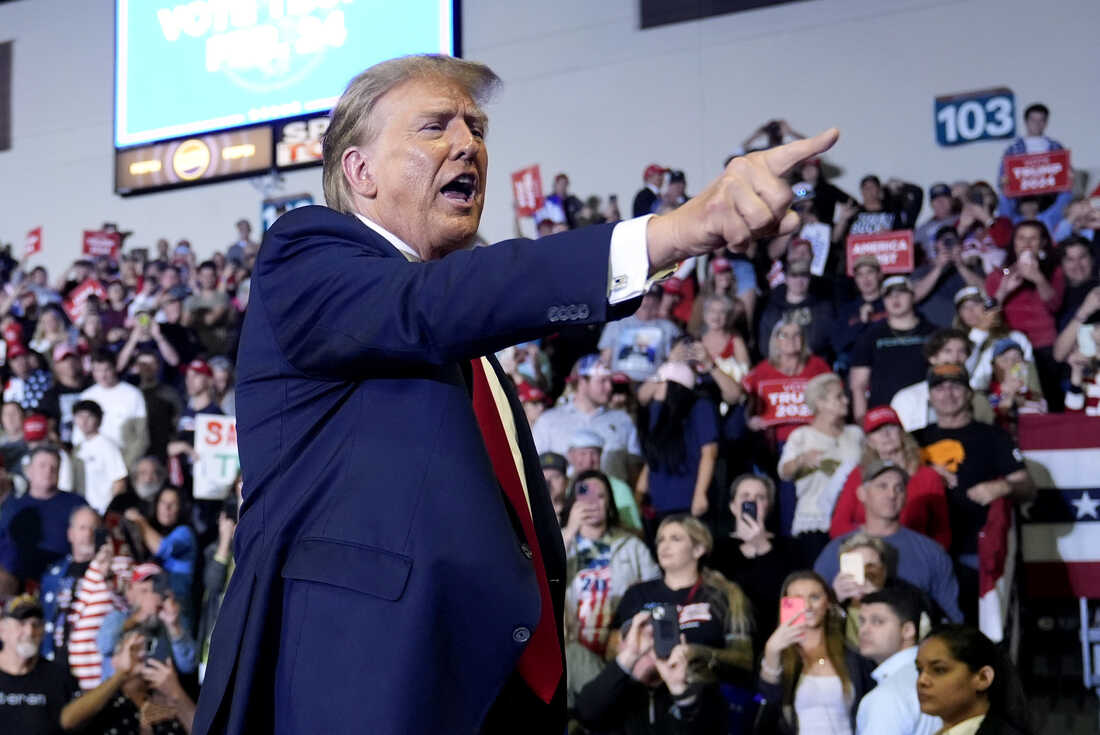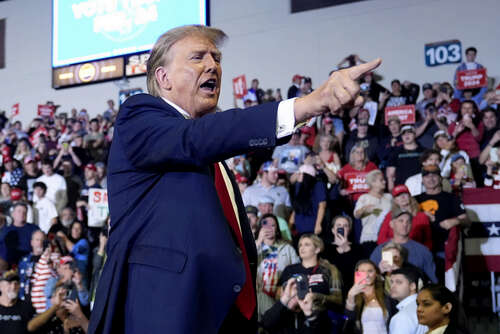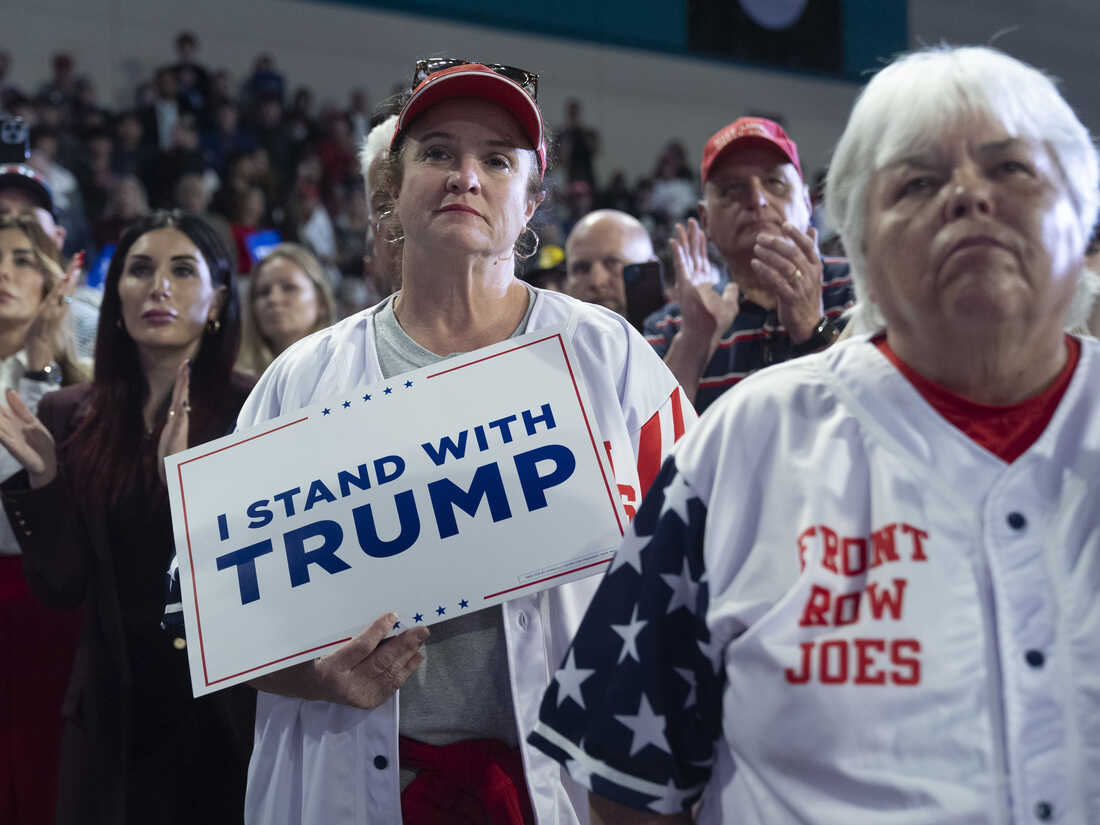
Republican presidential candidate former President Donald Trump gestures to the crowd after speaking at a Get Out The Vote rally at Coastal Carolina University in Conway, S.C., Saturday, Feb. 10.
Manuel Balce Ceneta/AP
hide caption
toggle caption
Manuel Balce Ceneta/AP

Republican presidential candidate former President Donald Trump gestures to the crowd after speaking at a Get Out The Vote rally at Coastal Carolina University in Conway, S.C., Saturday, Feb. 10.
Manuel Balce Ceneta/AP
When former president Donald Trump recalled a story at a campaign rally in South Carolina over the weekend about telling a European ally the U.S. would not defend them against Russia unless they spent more on defense, the reaction was swift and unsurprising.
The White House, in an uncharacteristic comment, called Trump’s story, where he allegedly told a fellow world leader he would encourage Russia to “do whatever the hell they want” to countries that did not meet NATO spending targets, “appalling and unhinged.”
NATO leadership said the suggestion that any member country would violate Article 5’s mandate that an attack on one is an attack on all “undermines all of our security,” while Republican lawmakers in Washington, D.C. had to answer questions about the remarks in interviews on television and in the hallways of the Capitol.
The inevitable cycle of Trump’s controversial statements and stances are nothing new since his first run for president in 2016, and neither are the inevitable responses and the weight those comments are given among various groups.
His opponents say to take him literally and seriously, Republican voters say to take him seriously but not literally and many of his allies in elected office often try to do neither.
Take the NATO remarks at a rally in Conway, S.C. on Saturday. The next day, Sen. Marco Rubio, R-Fla., a cosponsor of legislation that would prevent a president from leaving NATO without Senate approval, dismissed concerns about Trump’s assertions.
“One of the things I’m not going to do any longer is respond to every comment Donald Trump makes and say, ‘Do you still support him?'” he said on CNN. “I do, and I support him because Joe Biden’s a disaster.”
Rubio, who is vice chairman of the Senate Intelligence Committee, chalked the anecdote up to Trump’s speaking style.
“Donald Trump is not a member of the Council on Foreign Relations,” he said. “He doesn’t talk like a traditional politician, and we’ve already been through this. You would think people would’ve figured it out by now.”
The “seriously but not literally” aspect was on display at the packed rally on the campus of Coastal Carolina University, where his NATO comments were essentially treated as a throwaway line and received little traction among the crowd.

Trump supporter Christi McCuiston of Elon, NC, center, listens with other attendees as Republican presidential candidate former President Donald Trump speaks at a Get Out The Vote rally at Coastal Carolina University in Conway, S.C., Saturday, Feb. 10.
Manuel Balce Ceneta/AP
hide caption
toggle caption
Manuel Balce Ceneta/AP

Trump supporter Christi McCuiston of Elon, NC, center, listens with other attendees as Republican presidential candidate former President Donald Trump speaks at a Get Out The Vote rally at Coastal Carolina University in Conway, S.C., Saturday, Feb. 10.
Manuel Balce Ceneta/AP
Part of that is volume: Trump spent nearly two hours riffing about everything from his immigration proposals to the criminal charges against him, attacking President Biden and chief Republican rival Nikki Haley and featured a several minute interlude where the crowd chanted “F*** Joe Biden” as a few protesters were escorted out of the arena.
Part of that is Trump himself, who flits between issue-based commentary and seemingly random events, like a post on his social media site on Sunday that said pop superstar Taylor Swift should support him instead of Biden because he made her a lot of money.
His opponents, few in the Republican Party but plenty on the left, zeroed in on the remarks that would appear to abandon the NATO alliance and further strengthen Russia, as the latest example of why they feel he should not be the GOP nominee or the country’s next president.
Biden’s campaign issued a statement reiterating support for NATO and blasted Trump for “promising to rule as a dictator like the ones he praises on day one if he returns to the oval office.”
Less than two weeks before the South Carolina Republican presidential primary, Haley used the opportunity to excoriate Trump for his foreign policy stances and mocking comments he made about her husband, currently deployed in Africa with the South Carolina National Guard.
But herein lies the reality of Trump’s comments: it’s possible that if he is elected he will take steps to shrink the country’s international footprint and leave NATO, but it’s possible that it was just a throwaway line at one of many rallies he will hold before the election.



